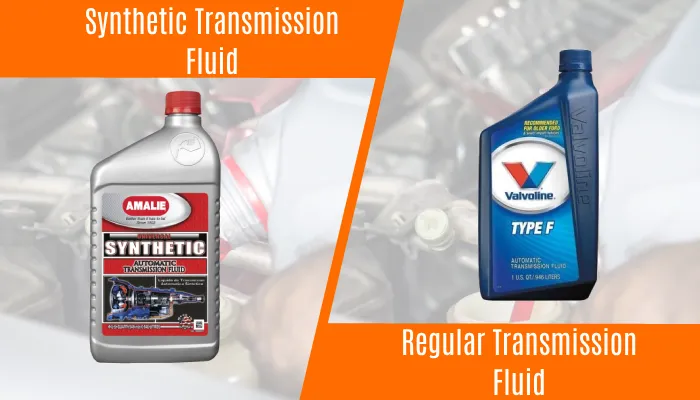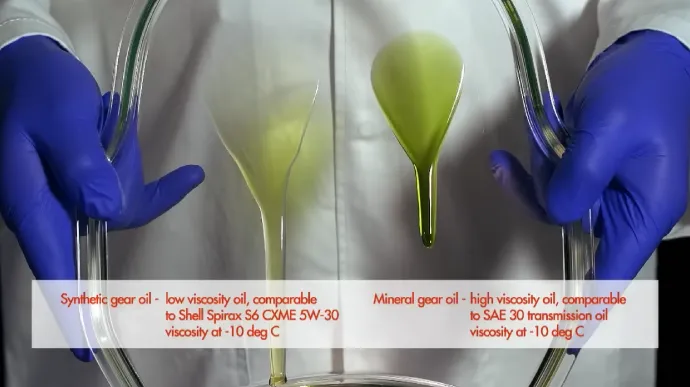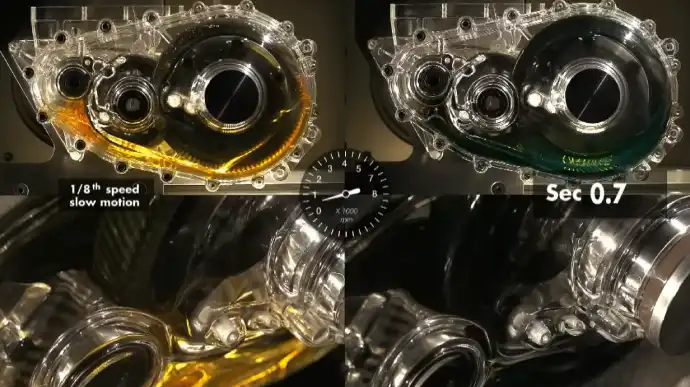Physical Address
304 North Cardinal St.
Dorchester Center, MA 02124
Physical Address
304 North Cardinal St.
Dorchester Center, MA 02124

Transmission fluid plays a crucial role in the proper functioning of a vehicle’s transmission system. It provides essential lubrication and cooling for the efficient operation of gears and other components.
In the realm of transmission fluids, there are two main categories: regular (conventional) transmission fluid and synthetic transmission fluid.
Regular transmission fluid, composed of various hydrocarbons, tends to be less chemically stable. It requires more frequent replacement due to potential oxidation and degradation.
On the other hand, synthetic transmission fluid, with its precisely engineered molecular structure, offers superior chemical stability.
Here, we’ll break down the distinctions between synthetic and regular transmission fluid. Also we provide you with the technical, analytical, and precise information you need to make an informed decision.

When comparing synthetic and regular transmission fluid for your vehicle, there are several important points to consider.
Improving the chemical stability of your transmission fluid is essential for maximizing its performance and extending its lifespan. When comparing synthetic and regular transmission fluids, one major difference is their chemical stability.
Synthetic transmission fluid is specially formulated with precise chemical reactions, resulting in a more stable fluid composition. This stability helps the fluid resist oxidation, which can lead to the formation of harmful acids and sludge.
Conversely, regular transmission fluid, made up of a mixture of hydrocarbons, may be less chemically stable and more susceptible to oxidation, especially at high temperatures. This can result in the breakdown of the fluid, reduced lubrication, and potential damage to the transmission system.
Synthetic transmission fluid is characterized by its thinner and less viscous consistency than regular transmission fluid. This thinner consistency offers several advantages.
On the other hand, regular transmission fluid is thicker and more viscous, potentially hindering the transmission’s efficiency. The increased viscosity may lead to increased resistance and decreased fluid flow, affecting the overall performance of the transmission system.
Another key difference between synthetic and regular transmission fluid for your vehicle is the varying levels of oxidation resistance.
Synthetic transmission fluid is specifically designed to have excellent resistance to oxidation, which helps maintain its integrity and performance over a longer period. This resistance to oxidation means that the synthetic fluid is less likely to break down, even under high temperatures and extended use.
Alternatively, regular transmission fluid may be more susceptible to oxidation, which can lead to the breakdown of the fluid and reduced effectiveness. This is particularly important as oxidation can cause the fluid to thicken, form deposits, and lose its ability to lubricate and protect the transmission components efficiently.
You can expect superior lubrication and gear protection when using synthetic transmission fluid in your vehicle.
Synthetic transmission fluid is specifically designed to provide optimal lubrication to gears, bearings, and shifting components. Its advanced molecular structure allows it to adhere to metal surfaces more effectively, reducing friction and wear.
This results in smoother gear changes, improved transmission performance, and extended component life.
In contrast, regular transmission fluid may not offer the same level of lubrication and protection. Its composition and viscosity may be less stable, leading to increased friction and potential damage to transmission parts.
If you frequently drive in high-temperature conditions, synthetic transmission fluid in your vehicle can help prevent overheating and potential damage to your transmission components.
Synthetic transmission fluid has a lower viscosity index, so it flows more easily and can dissipate heat more efficiently. It is designed to withstand higher temperatures without breaking down, ensuring your transmission stays properly lubricated and protected.
Meanwhile, excessive heat can lead to the breakdown of regular transmission fluid, causing it to lose its lubricating properties and potentially damage the transmission. Regular transmission fluid can also evaporate more quickly when exposed to high temperatures.

Regular transmission fluid does not prevent rust and corrosion as effectively as synthetic fluid, thus extending the life and performance of your vehicle’s transmission.
Synthetic transmission fluid is specifically formulated to provide superior protection against rust and corrosion in metal parts. This is achieved through advanced additives and detergents that create a protective barrier on the metal surfaces, preventing moisture and salt from causing damage.
Conversely, regular fluid lacks these specialized additives and is less effective in protecting against rust and corrosion. This difference is particularly important in regions with harsh climates or if your vehicle is frequently exposed to salt and moisture.
Regular transmission fluid typically has a shorter lifespan than synthetic, requiring more frequent replacement within 30,000 to 60,000 miles. The limited lifespan of regular transmission fluid is due to its composition, often of conventional petroleum-based oils.
These oils tend to break down more quickly under high temperatures and heavy loads, leading to a decrease in their effectiveness over time.
On the other hand, synthetic transmission fluid is formulated with specially engineered molecules that offer superior resistance to heat and oxidation. This allows synthetic fluid to maintain its performance and protective properties for longer, resulting in a service life of 60,000 to 100,000 miles or more.
Enhancing performance, durability, and protection in classic cars, the choice of transmission fluid can significantly impact the overall performance of the vehicle.
When comparing synthetic and regular transmission fluid, synthetic ATF offers several advantages that can enhance the performance of classic cars.
Synthetic ATF is designed to provide better lubrication and reduce friction, resulting in smoother gear shifts and improved power transfer. This can lead to increased acceleration and overall performance.
Additionally, synthetic ATF has a higher heat resistance, which is crucial for classic cars with older transmissions that may run hotter. The superior thermal stability of synthetic ATF ensures that the fluid maintains its properties and performance even under extreme temperatures.
Meanwhile, regular ATF contains paraffin-based additives that can cause deposits and varnish to collect on components over time. This reduces the efficiency of the transmission and negatively impacts the overall performance of classic cars.
Regarding the cost-effectiveness of synthetic and regular transmission fluid for your vehicle, you can save money in the long run by choosing synthetic ATF.
While synthetic transmission fluid may have a higher upfront cost, its superior performance and longer lifespan make it a more cost-effective option.
Synthetic ATF is specifically engineered to provide better protection and lubrication for your vehicle’s transmission, reducing wear and tear on the internal components. This can result in fewer repairs and maintenance expenses down the line.
Additionally, synthetic ATF’s longer service intervals mean that you won’t have to change the fluid as frequently as you’d with regular transmission fluid. This further contributes to the overall cost savings of using synthetic ATF in your vehicle.
In contrast, regular transmission fluid is not designed to provide the same level of protection and lubrication as synthetic ATF. It also has shorter service intervals, so you’ll have to change it more often than with synthetic ATF.
| Feature | Synthetic Transmission Fluid | Regular Transmission Fluid |
| Chemical Stability | Formulated with precise chemical reactions for stability. Resists oxidation, preventing harmful acids and sludge. | The composition of hydrocarbons may be less stable, more susceptible to oxidation, leading to fluid breakdown and reduced lubrication. |
| Physical Thickness | Thinner consistency reduces friction, allowing for smoother operation. Improved flow properties for better lubrication. | Thicker and more viscous, potentially hindering efficiency with increased resistance and decreased fluid flow. |
| Oxidation Resistance | Specifically designed for excellent resistance to oxidation, maintaining integrity and performance over time. | More susceptible to oxidation, leading to breakdown, reduced effectiveness, and potential thickening of the fluid. |
| Lubrication and Protection | Superior lubrication to gears, bearings, and shifting components. The advanced molecular structure reduces friction and wear. | May not offer the same level of lubrication and protection, potentially leading to increased friction and damage to transmission parts. |
| Temperature Control | Lower viscosity index allows for efficient heat dissipation, preventing overheating and damage. Withstands higher temperatures without breaking down. | Higher viscosity may lead to breakdown under high temperatures, causing loss of lubricating properties and potential damage. |
| Rust and Corrosion Prevention | Provides superior protection against rust and corrosion with advanced additives and detergents. | Less effective in preventing rust and corrosion due to the absence of specialized additives. |
| Lifespan | Longer lifespan (60,000 to 100,000 miles or more) due to superior resistance to heat and oxidation. | Shorter lifespan (30,000 to 60,000 miles) due to quicker breakdown under high temperatures and heavy loads. |
| Performance in Classic Cars | Enhances performance, durability, and protection. Better lubrication, reduced friction, and higher heat resistance. | May cause deposits and varnish over time, reducing transmission efficiency and negatively impacting overall performance. |

Transmission fluid, whether synthetic or regular, isn’t called oil. While both transmission fluid and engine oil serve important functions in a vehicle, they’ve distinct properties and purposes.
Unlike engine oil, transmission fluid is specifically designed to act as a hydraulic fluid, helping gears change smoothly and efficiently. It is a lubricant and coolant for the transmission system, protecting the gears and clutches from friction and heat.
Transmission fluid has a higher viscosity than engine oil, allowing it to flow properly through the transmission system and provide the necessary lubrication and protection. It’s typically a deep red color, distinguishing it from the golden hue of engine oil.
Synthetic transmission fluid doesn’t inherently cause leaks in older vehicles. It can condition and extend the lifespan of seals.
The misconception arises from the fact that synthetic transmission fluid has a lower viscosity at low temperatures than regular transmission fluid. This means that in cold weather, the synthetic fluid may flow more easily through small cracks or worn seals, which can give the appearance of a leak.
However, as the temperature increases, the viscosity of synthetic transmission fluid increases as well, providing the necessary protection and preventing leaks.
If you’re towing or handling heavy loads, regular transmission fluid may not provide the necessary protection and performance. The additional strain on the transmission can lead to increased heat generation and potential fluid breakdown.
Regular transmission fluid is designed to meet the needs of normal driving conditions. However, it does not have the required additives and viscosity to handle the extra stress of towing and heavy loads.
As you can see, vehicle owners and enthusiasts must understand the intricacies of regular transmission fluid.
Synthetic transmission fluids offer a range of advantages, such as superior lubrication, extended service life, and temperature control, which make them an excellent choice for many modern vehicles. Conversely, regular transmission fluids have their place, particularly in older or less demanding applications.
Understanding the differences and nuances between these two fluid types allows vehicle owners to make choices. As a result, their transmissions remain reliable and meet their specific needs.
Therefore, opting for synthetic transmission fluid can greatly enhance the longevity and reliability of your vehicle’s transmission system.